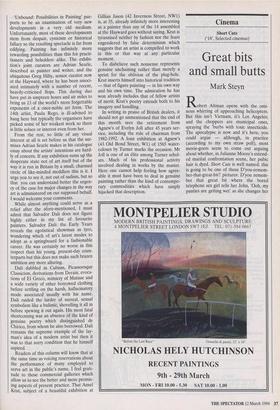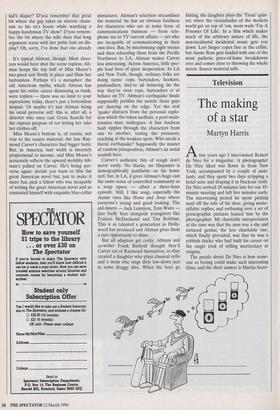Cinema
Short Cuts (`18', Selected cinemas)
Great bits and small butts
Mark Steyn
Robert Altman opens with the omi- nous whirring of approaching helicopters. But this isn't Vietnam, it's Los Angeles; and the choppers are municipal ones, spraying the 'burbs with toxic insecticide. The apocalypse is now and it's here, you could argue — although, in practice (according to my own straw poll), most movie-goers seem to come out arguing about whether, in Julianne Moore's extend- ed marital confrontation scene, her pubic hair is dyed. Short Cuts is well named; this is going to be one of those D'you-remem- ber-that-great-bit? pictures: D'you remem- ber that great bit where the bored telephone sex girl tells her John, 'Ooh, my panties are getting wet' as she changes her kid's diaper? D'you remember that great bit where the guy takes an electric chain- saw to his ex's house while watching a happy-handyman TV show? D'you remem- ber the bit where the wife does that long argument scene with her pubic hair on dis- play? Oh, sorry, I've done that one already It's typical Altman, though. Most direc- tors would have shot the scene topless; Alt- man keeps the top half of Miss Moore's two-piece suit firmly in place and films her bottomless. Perhaps it's a metaphor: the old American myths, which Altman has spent his entire career dismissing as bunk, were topless — there was no limit to your aspirations; today, there's just a bottomless despair. Or maybe it's just Altman being his usual perverse self: this is, after all, a director who once cast Greta Saatchi for the express purpose of not letting her take her clothes off.
Miss Moore's bottom is, of course, not true to the source material: the late Ray- mond Carver's characters had bigger butts. But, in America, butt width is inversely proportional to income, and Miss Moore's accurately reflects the upward mobility Alt- man's pulled on Carver. He's being per- verse again: decide you want to film the great American novel but, just to make it more fun, pick a fellow who was incapable of writing the great American novel and so contented himself with exquisite blue-collar miniatures. Altman's selection streamlines the material: he has an obvious fondness for characters who are in some form of communications business — from tele- phone sex to TV current affairs — yet who are incapable of communicating in their own lives. But, by intertwining eight stories and then relocating them from the Pacific Northwest to LA, Altman makes Carver less interesting. Across America, little peo- ple lead lives of quiet desperation. In LA and New York, though, ordinary folks are doing turns: cops, bartenders, hookers, panhandlers, they're all behaving lin the way they've seen cops, bartenders et al behave on TV. Altman's earthquake finale supposedly justifies the switch: these guys are dancing on the edge. Yet the real 'quake distracts from the personal explo- sion which the token lardbutt, a pool main- tenance man, undergoes. A San Andreas fault ripples through the characters from one to another, testing the pressures, cracking at the weakest spots. Who needs a literal earthquake? Supposedly the master of random juxtaposition, Altman's an awful neatnik here.
Carver's authentic bits of rough don't move easily. No blacks, no Hispanics is demographically justifiable on his home turf, but, in LA, it gives Altman's huge cast the same sense of controlled community as a soap opera — albeit a three-hour episode. Still, I like soap, especially the Aussie ones like Home and Away where everyone's young and good looking. The old-timers — Jack Lemmon, Tom Waits fare badly here alongside youngsters like Frances McDormand and Tim Robbins. This is as talented a generation as Holly- wood has produced and Altman gives them a rare opportunity to shine.
But all adaptors get cocky. Altman and co-writer Frank Barhydt thought they'd Carver cut of Raymond themselves, so they created a daughter who plays classical cello and a mom who sings dirty low-down jazz in some druggy dive. When the boys go fishing, the daughter plays the 'Trout' quin- tet; when the viccissitudes of the modern world get on top of 'em, mom wails 'I'm A Prisoner Of Life'. In a film which makes much of the arbitrary nature of life, the non-incidental incidental music gets you down. Lori Singer copes fine as the cellist, but Annie Ross gets landed with one of the most pathetic price-of-fame breakdowns ever and comes close to throwing the whole movie. Source material tells.



















































 Previous page
Previous page